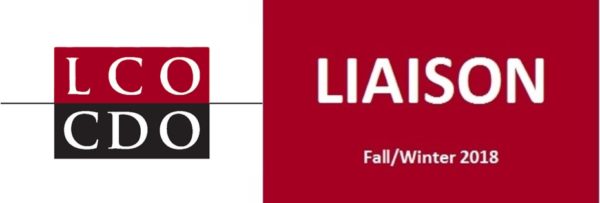This post is also available in: français (French)


Reflecting on the past and preparing for the future
A message from LCO Executive Director Nye Thomas
Welcome to the latest edition of the Liaison, the LCO newsletter. I hope you enjoy our new electronic format.
This issue highlights an important milestone for the LCO. It has been 10 years since we published our first report back in November 2008. Enjoy our feature story and the attached special report that summarizes our work and impact over the years. It’s worth noting that the LCO remains a singularly unique institution in Ontario. We also remain committed to producing independent, evidence-based, multidisciplinary, practical and authoritative recommendations on some of Ontario’s most complex law reform issues.
This issue also highlights the next phase of the LCO’s work: law reform and technology . The LCO will be formally launching our digital rights project before the end of the year. This project is driven by our conviction that digital rights are quickly emerging as the next frontier of access to justice in Ontario and across Canada.
To most people in Ontario’s justice system, digital access to justice probably implies e-filing, smart forms, web-based public legal information or education, justice system “apps” or, perhaps, how we can reduce the “digital divide”. These issues are obviously important, and many people and institutions are working to address them. The LCO’s project is committed to a much different set of issues, though: legal issues respecting digital due process, artificial intelligence and automatic legal decision-making, online “click” contracts and work in the gig economy. Each of these topics raises serious, complicated and far-reaching concerns. Digital access to justice challenges are unquestionably the future of access to justice law and policy.
The LCO began working on law and technology issues in 2016. Our “digital” work began with our Big Data and the Justice System Symposium and has continued through our Defamation in the Internet Age project, our work at RightsCon 2018 and our Roundtable on Digital Rights and Digital Society with the Mozilla Foundation.
We learned some important lessons over the last two years, some of which we have shared in our LCO/Mozilla Roundtable report. For example, we learned about the importance — and difficulty — of incorporating access to justice principles into the design of automated systems. We learned about the serious challenges to current models of access to justice, due process and legal regulation. And we learned how crucial it is to engage new stakeholders, many of whom have no background in “traditional” access to justice policy.
Many organizations, institutions, and individuals have begun to address these issues. We hope you will join the LCO in the coming months and years as we add our contribution.
Nye Thomas
Read about the LCO’s new board chair and other Board and staff changes.
IN THIS ISSUE
A decade of law reform
2018 marks the 10-year anniversary of the LCO’s first ever law reform report. MORE
———-
Regulating new technology
The LCO is blazing the trail for a new digital rights agenda in Ontario. MORE
———-
The world is watching
LCO’s Defamation in the Internet Age project is attracting interest from around the globe. MORE
———-
Passing the torch
New Board Chair Andrew Pinto prepares to chart the LCO through one of its busiest years yet. MORE
———-
Law reform firsts
There’s a new look to law reform research for the LCO’s Class Actions and Last Stages of Life projects. MORE
